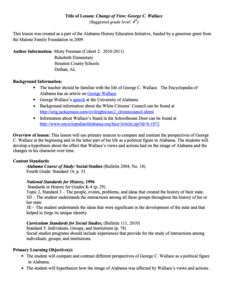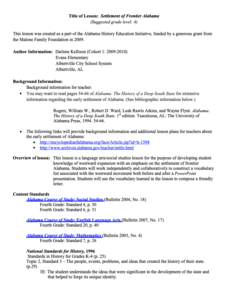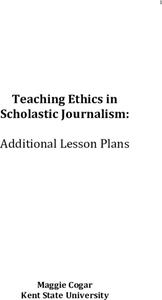DocsTeach
Reasons for Westward Expansion
"Go West, young man!" is a familiar refrain in American history. But why did people leave their homes in the East to travel westward and what impact did that movement have on people already living in the American West? By examining...
Cheryl L. Mason and William G. Thomas
Comparative Effects of Financing the Civil War
How do countries fund wars? Learners examine the economics of warfare through a comprehensive study of what measures were taken to fund wartime activities during the American Civil War. They'll start by reading a newspaper article from...
School Improvement in Maryland
Regulatory Agency
Five governmental regulatory agencies are tasked to respond to market failure. Groups investigate the roles of each of these agencies as well as the social, economic, and political impact of their actions.
North Carolina Consortium for Middle East Studies
Federalists v. Anti‐Federalists
Here is a solid lesson plan to support your instruction on the Continental Congress and the Articles of Confederation. It includes close analysis of primary source images, a guided notes template and answer key, and many key points to...
Curated OER
French Revolution Unit Plan
"Let them eat cake" are the famous words attributed to Marie Antoinette, but what really caused the French Revolution? The unit plan provides 20 lessons including the worksheets needed for a complete study of the French Revolution. Young...
Alabama Department of Archives and History
Change of View: George C. Wallace
Who exactly was George C. Wallace? A great lesson plan provides young historians with a hands-on activity, direct instruction, and discussion to learn about Wallace, why he was an important figure, and why he changed his mind about...
Alabama Department of Archives and History
Settlement of Frontier Alabama
What comes to mind when the class imagines settlers traveling out West? The lesson teaches pupils about the western frontier of Alabama and what life was like for people traveling West—in wagons with few possessions. Scholars write,...
Smithsonian Institution
Mexican War
Did you know that without the Mexican War, the United States would not include the states of Arizona, California, New Mexico, Texas, Nevada, Utah, and even parts of Colorado? Scholars learn a variety of interesting facts about the...
Smithsonian Institution
War of Independence
Want to explain the War of Independence without using just a textbook? The resource, an online exhibition, provides direct instruction to scholars. It discusses what led up to the war, the time of the war, and the legacy left behind long...
Reading Through History
The Fugitive Slave Act of 1850
Why was the Fugitive Slave Act of 1850 so important? The reading in the resource discusses how the act affected Southerners, Northerners, and the slaves themselves. Scholars complete the reading as a form of direct instruction while...
PBS
Explicit and Implicit Language – Interpreting the Meaning of the Fourteenth Amendment
How do Supreme Court justices interpret amendments to the Constitution? The resource helps answer that question by discussing how people use explicit and implicit language to interpret the meaning of the Fourteenth Amendment. Learners...
Describing Egypt
Sennedjem - (19th Dynasty)
Who was Sennedjem and how does he relate to ancient Egypt? The resource describes the artisan's life as well as the village in which he lived, called Set Ma'at. Learners view where the people who built the tombs for powerful Egyptians...
Curated OER
Directions, Directions
Third graders review cardinal directions, moving around the room so that they are standing in the part of the room that is nearest the north, south, east and west. They are asked what would you do if they are lost? Pupils work as a...
Teaching Tolerance
Community Newsletter
What does it take to develop and publish a newsletter? Young academics create a newsletter with original artwork for their school or community. They explore social justice themes and spread messages of tolerance and inclusion. Scholars...
Center for Civic Education
Becoming an Informed Voter: Creating Initiatives
Continuing from a previous lesson on how to read and analyze proposed legislation on election ballots, your class members will now practice writing up their own proposals for a new school rule or local ordinance that will be discussed...
PBS
Rosa Parks: Civil Rights Activist
Scholars examine the courageous efforts made by civil rights activist, Rosa Parks. Discussion questions and a brief writing assignment follows a short film. A photograph and a silent film delve deeper into Park's history and three...
Curated OER
Cardinal Directions
Students explore cardinal directions. In this social studies lesson, students create maps of home and school using the cardinal directions.
Curated OER
Pre-Columbian Cultures in the Americas
Native American studies is fun, educational, and highly motivating. Fifth graders will gain a deeper understanding of the six major pre-Columbian culture areas on the North American continent. They will choose one group and conduct...
US National Archives
Documented Rights Educational Lesson Plan
How have groups struggled to have their unalienable rights recognized in the United States? Acting as a research team for the Human Rights Council of the United Nations, your young historians will break into groups to research how people...
Annenberg Foundation
America's History in the Making: Classroom Applications Three
How can primary sources bring history to life? Scholars create detailed lesson plans on the late nineteenth and early twentieth centuries in American history. The 17th installment of a 22-part program exploring American history examines...
College Board
AP® Psychology: Teaching Statistics and Research Methodology
Psychologists use statistics? Scholars investigate the research behind the methodology of statistical analysis. Using hands-on practice, case-studies, and scatterplots, they complete various tasks to understand the very roots of high...
iCivics
LawCraft
What's it like to be a senator or member of the House of Representatives? Using a video game simulation, learners discover what it is like to craft and pass legislation from its idea through conference committee. Pop ups and annotation...
Kent State University
Teaching Ethics in Scholastic Journalism
Events in recent years have underscored the importance of a free and independent press in a democracy. Young journalists engage in lessons about the function of journalism in a democratic society, practice the steps of Bok's Ethical...
BrainPOP
Civil Rights Lesson Plan: Tracking History Through Timelines
Use the accompanying assessment to determine your class's prior knowledge on Martin Luther King, Jr. before beginning a lesson plan on the famous civil rights movement leader. The resource has young historians thinking about life for...

























